
 Flash News
Flash News
Ceno Klosi with over 800 stolen votes, Balluku finds the reason is the tiredness of the counters
"Fast & Furious" in the former Block, police chase an Audi Q8, 4 cars collide
Car hits two tourists on a motorcycle in Fushe Arrëz, one of them dies
Serious accident in Thumanë, one dead, 3 injured
Durrës Court suspends the director of Pre-University Education from duty

Blendi Kajsiu / Gazeta Panorama
The victory of Vetëvendosje in Kosovo has produced the explosion of the myth of Albin Kurti in Tirana. If you listen to the Albanian analysts and media, you will get the impression that he won the elections alone, blowing up the Kosovar political system. So many are starting to wonder if Albania will give birth to an Albin (as Enver once was born).
Both those who criticize it and those who support it deal almost exclusively with the person, completely ignoring the organization, members, or political program and new ideas on the development model offered by Vetëvendosje. This analysis ignores the Kosovar political context, especially the causes of the degradation of the main parties there.
The first paradox is that the cult of Albin is rising and strengthening more by those outside Vetëvendosje than by its members. The latter know very well that the victory of Vetëvendosje was not the merit or exclusive achievement of an individual, although of course, they have a deep love for the leader and what he represents. They know very well that Vetëvendosje is the product of a collective action that was built in time on the sweat and sacrifice of many activists, who have even given their lives for the ideas it defends.
It is the Albanian analysts and media that erase the history and context of Vetëvendosje, ignore the ideas that Albini represents to deal simply with the person. Thus, the future victory and government of Vetëvendosje is analyzed starting from its character and origin. Political analysis is transformed into the psychological analysis. Instead of analyzing Vetëvendosje's ideas and program, analysts deal with its leader's deep and dark desires to become Enver and his family origins, degrading gossip analysis in the studio.
And here we come to the second paradox. The main producers of Albin's cult today in Tirana are his biggest critics. According to them, victory is all his. Therefore, the responsibility will be all his when he fails in governance, which assures us that it will definitely happen.
Despite the criticism, in these analyzes, Albini appears as a superhuman being. He wins the election alone, governs alone, fails, and achieves success alone. Everything that happens from now on in Kosovo is simply and only a product of his will. When we say Kosovo, we mean Albini and vice versa. It is precisely these analysts who criticize him as a dictator and authoritarian, who, in fact, are giving Albin today the status that Enver Hoxha had yesterday.
In political science, this is called a self-fulfilling prophecy. By dealing only with Albin, ignoring the ideas he and Vetëvendosje represent, ignoring the political and social context that produced them, treating Vetëvendosje as the leader's private property, analysts and the media nurture exactly what they are denouncing: the personalization of policy.
Unlike the analysts in question, I can not predict the future. I do not know if Vetëvendosje will succeed or will definitely fail, as some of them assure us. It is very likely that her government will have successes and failures. But what we know from our experience, both with communism and with the transition, is that the personalization of politics produces from dictators like Enver to authoritarian politicians like Berisha or Rama.
In fact, one of the reasons why the Albin myth is being cultivated so much in Albania is because our media and analysts have a long tradition in this field. Partly due to the lack of academic debate, the analysis of communism in our country has already been reduced to the character of Enver Hoxha, which seems to explain why our communism was so savage compared to its neighbors. It does not matter that our social and demographic structure was quite different from Yugoslavia, Hungary or Poland.
Transition developments are treated in the same way. Azemi overthrew communism with Berisha, it does not matter that he was in crisis for years. The pyramids were a product of Berisha, despite the fact that pyramid schemes are a constant phenomenon of capitalism, even in the US. Likewise, money laundering in the Albanian economy and organized crime are simply Rama's wishes. It does not matter that money laundering today is a product of financial market liberalization. Much more money is laundered in London and Switzerland than in Albania, not to mention tax-havens.
This personalization of politics, its reduction to the omnipotent will of an individual, produces precisely the dictators he denounces. Therefore, reducing the electoral upheaval that occurred in Kosovo to an individual is both wrong and dangerous.
Latest news





Lufta në Gaza/ Pse Netanyahu do vetëm një armëpushim 60-ditor, jo të përhershëm?
2025-07-02 21:56:08
US suspends some military aid to Ukraine
2025-07-02 21:40:55



Methadone shortage, users return to heroin: We steal to buy it
2025-07-02 20:57:35
Government enters oil market, Rama: New price for consumers
2025-07-02 20:43:30
WHO calls for 50% price hike for tobacco, alcohol and sugary drinks
2025-07-02 20:41:53







Israel agrees to 60-day ceasefire in Gaza, but many unanswered questions remain
2025-07-02 18:35:27
The weather in Germany is going "crazy", temperatures reach 40°C
2025-07-02 18:22:21

"Fast & Furious" in the former Block, police chase an Audi Q8, 4 cars collide
2025-07-02 17:59:25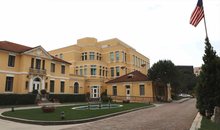
"Birth on a tourist visa? US Embassy warns Albanians: This is prohibited!"
2025-07-02 17:48:16


BIRN: Fier recount reveals vote trafficking within open political party lists
2025-07-02 16:57:19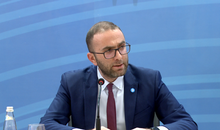

CEO and former director of 'Bankers Petroleum' arrested in Fier
2025-07-02 16:40:42
Car hits two tourists on a motorcycle in Fushe Arrëz, one of them dies
2025-07-02 16:33:23



Fire at the Elbasan Incinerator Landfill, Prosecution Launches Investigations
2025-07-02 15:34:54
What you need to know if you travel to a country with active volcanoes
2025-07-02 15:33:03



EU proposes 90% reduction in greenhouse gases by 2040
2025-07-02 14:50:23
Europe is burning from the heat / Italy and France are on maximum alert
2025-07-02 14:36:52

Moscow's contradictory statements: Is the friendship with Vučić breaking down?
2025-07-02 14:21:05
'I lost my battle': Sea warming is killing fishing in Albania
2025-07-02 14:08:35
Sekretet kimike që ndihmojnë në mbajtjen e mjaltit të freskët për kaq gjatë
2025-07-02 14:01:26
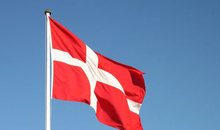
Denmark makes historic decision to make military service mandatory for women
2025-07-02 13:44:33
The appeal of the GJKKO leaves former judge Pajtime Fetahu in prison
2025-07-02 13:30:20
Productivity losses could reduce GDP by 1.3% as a result of extreme heat
2025-07-02 13:21:04
He abused his minor daughter, Zamir Meta is left in prison
2025-07-02 13:04:04

Waste burning in Elbasan, Alizoti: They are poisoning people and stealing money
2025-07-02 12:48:39
Civil disobedience continues in Serbia, dozens of people detained
2025-07-02 12:40:32
Rama's government was born under the sign of garbage and will end like this
2025-07-02 12:28:09
Water prices increase in the municipalities of the Elbasan region
2025-07-02 12:13:38
Civil disobedience continues in Serbia, what is happening in Belgrade?
2025-07-02 12:07:44
Serious accident in Thumanë, one dead, 3 injured
2025-07-02 11:54:42
Durrës Court suspends the director of Pre-University Education from duty
2025-07-02 11:49:27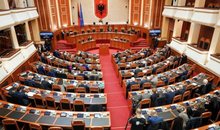
Plenary session on Thursday, what is expected to be discussed
2025-07-02 11:36:43
Europe is burning from heat waves/ What is the 'thermal dome' phenomenon?
2025-07-02 11:26:25
Wanted by Italy for murder, 45-year-old arrested in Vlora
2025-07-02 11:19:31
Fire situation, 28 fires reported in 24 hours, 2 still active
2025-07-02 11:13:20
"Buka" file, preliminary hearing for Ahmetaj postponed to July 17
2025-07-02 11:03:30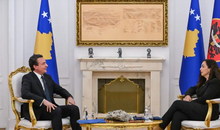
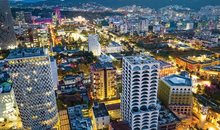

Baçi: Belinda Balluku and Ceno Klosi, the most dangerous "gangs" in Fier
2025-07-02 10:32:09
Zamir Meta, suspected of sexually abusing his daughter, arrives in court
2025-07-02 10:21:33

Trump: Israel has agreed to a 60-day ceasefire in Gaza
2025-07-02 10:01:55
Fire continues at Elbasan landfill
2025-07-02 09:51:13

Dates to note during July, important events will occur
2025-07-02 09:31:45
The hearing for Jorgo Goro's claim is postponed
2025-07-02 09:24:19



Foreign exchange, the rate at which foreign currencies are sold and bought
2025-07-02 08:42:31

52% of pensioners did not receive full pension in 2024
2025-07-02 08:27:18
Horoscope, what do the stars have in store for you today?
2025-07-02 08:13:36
Hot weather, Wednesday brings high temperatures
2025-07-02 07:59:16
Morning Post/ In 2 lines: What mattered yesterday in Albania
2025-07-02 07:46:15
Heatwave sweeps across Europe, Spain and England record hottest June ever
2025-07-01 22:57:41






Golem and Qerret without water at the peak of the tourist season
2025-07-01 21:09:32

Euractiv: Italy-Albania migrant deal faces biggest legal challenge yet
2025-07-01 20:53:38
BIRN: Brataj and Fevziu victims of a 'deepfake' on Facebook
2025-07-01 20:44:00

Vlora by-pass, work delays and cost increases
2025-07-01 20:24:29



Milan are expected to give up on the transfer of Granit Xhaka
2025-07-01 19:41:25

